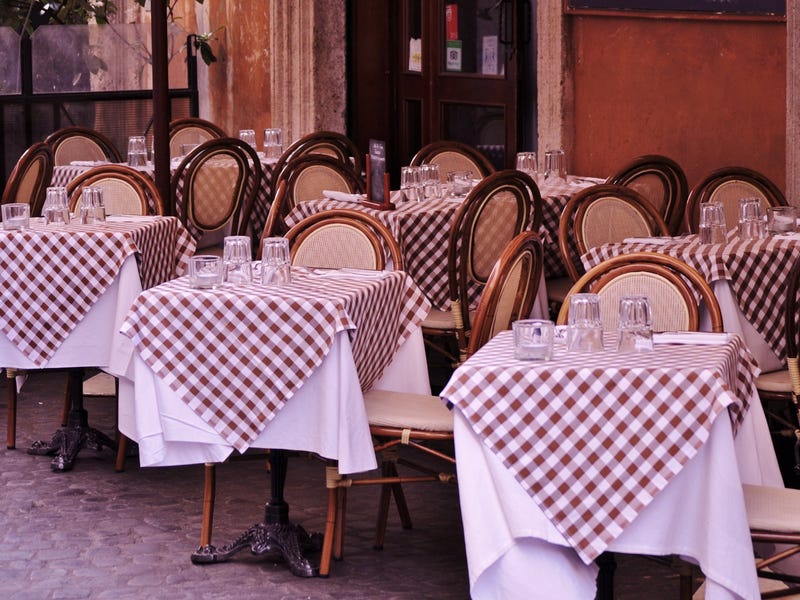Have you ever wondered how to say good luck in Italian? Well, consider yourself lucky, because this article was written just for you.
Knowing how to say good luck in Italian can be quite useful when interacting with Italians or traveling around the country. In fact, superstitions are actually quite common throughout Italy (especially in the south) and some regions even have their own good luck charms or traditions to ward off bad luck!
In this article, you’ll learn how to wish someone good luck and offer up some words of comfort in Italian. Plus, we’ll explore some cultural references about luck, which will hopefully help you avoid any unlucky mishaps.
Sometimes, just a basic understanding of Italian language essentials is all you need. Download your free Italian language essentials eBook here.
Our first stop? Into the wolf’s mouth!

How to say Good luck in Italian
When it comes to wishing someone Good luck in Italian, we’re lucky enough to have lots of options at our fingertips. Let’s break it down with a literal translation.
Fortuna means luck, and buona means good. So, quite simply, you can say Buona fortuna when wishing someone good luck in Italian. However, you’re more likely to hear another Italian phrase to convey the same meaning: In bocca al lupo!
This phrase is literally translated to “Into the wolf’s mouth!”, and there are a few theories about its exact origins, which we’ll cover at the end of the article. Basically, using this somewhat “dangerous” or negative phrase to wish someone good luck is supposed to ward off the possibility of accidents. The idea is similar to the idiom, “Break a leg!”
It’s important to remember that if someone wishes you In bocca al lupo, the standard response is Crepi il lupo, or simply, Crepi. This response replaces Grazie and shows that you will defeat “the wolf”, which represents the potentially scary thing you’re about to confront, like difficult exams or making your debut as the lead actor on opening night. (Yes - this handy phrase can even mean “Break a leg!”).
In this table, you’ll find useful phrases you can use to talk about luck. You’ll even notice that some phrases like “knock on wood” and “fingers crossed” are also used by Italian speakers!
| English | Italian | Pronunciation | IPA |
| Good luck! | Buona fortuna! / In bocca al lupo! | bwon-a four-too-na / een bok-kah al loo-poe | ˈbwɔna forˈtuna / im ˈbokka al ˈlupo |
| Good luck my friend. | Buona fortuna, amico/a mio/a! In bocca al lupo, amico/a mio/a! |
bwon-a four-too-na ah-me-ko / ah-me-ka mee-ah! een bok-kah al loo-poe ah-me-ko / ah-me-ka mee-ah! |
ˈbwɔna forˈtuna | aˈmiko ˈmio ˈbwɔna forˈtuna | aˈmika ˈmia im ˈbokka al ˈlupo | aˈmiko ˈmio im ˈbokka al ˈlupo | aˈmika ˈmia |
| Break a leg! | In bocca al lupo! | een bok-kah al loo-poe | im ˈbokka al ˈlupo |
| You’re lucky! | Sei fortunato/a! | say four-too-nah-to / four-too-nah-tah | ˈsɛi̯ fortuˈnato ˈsɛi̯ forˈtunata |
| I wish you success. | Ti auguro il successo. | tee ow-goo-roh eel soo-chess-oh | ti ˈau̯ɡuro il sutˈtʃɛsso |
| I wish you the very best. | Ti auguro il meglio. | tee ow-goo-roh eel mel-yo | ti ˈau̯ɡuro il ˈmɛʎʎo |
| I wish you the very best. (more colloquial) | Tante belle cose. | tan-teh beh-leh ko-seh | ˈtante ˈbɛlle ˈkɔze |
| Best wishes! | Auguri!* | ow-goo-ree | ˈau̯ɡuri |
| Good luck and best wishes. | In bocca al lupo e auguri! | een bok-kah al loo-poe eh ow-goo-ree! | im ˈbokka al ˈlupo ˈe ˈau̯ɡuri |
| Good luck tomorrow! | Buona fortuna domani! | bwon-a four-too-na doe-mah-nee | ˈbwɔna forˈtuna doˈmani |
| Good luck on your test. | Buona fortuna per l’esame. | bwon-a four-too-na per leh-sah-meh | ˈbwɔna forˈtuna ˈper leˈzame |
| Fingers crossed! | Incrociamo le dite! | een-kro-chya-moh leh dee-teh | inkroˈtʃamo ˈle ˈdite |
| Knock on wood! | Tocca ferro! | toe-kah fer-roh | ˈtokka ˈfɛrro |
| Have courage! | Coraggio! | ko-rah-joe | koˈraddʒo |
| I hope everything goes well. | Spero che tutto vada bene. | spe-roh ke two-toe vah-dah beh-neh | ˈspɛro ˈke ˈttutto ˈvada ˈbɛne |
*This can also be used to say “Happy birthday!” or “Congratulations!”
Words of comfort and encouragement in Italian
In addition to wishing someone buona fortuna, words of comfort and encouragement are always welcomed. Take a look at the typical phrases in this table, and then check out some ways you may see them used in the different scenarios below.

| English | Italian | Pronunciation | IPA |
| You are awesome! | Sei fantastico/a! | say fahn-tas-tee-ko / fahn-tas-tee-kah | ˈsɛi̯ fanˈtastiko ˈsɛi̯ fanˈtastika |
| You are going to do great! | Andrai alla grande! | an-dry ah-la gran-deh | andrai̯ alla ˈɡrande |
| Get well soon. | Guarisci presto. | gwa-ree-she pres-toe | ɡwaˈriʃʃi ˈprɛsto |
| Everything will be okay. | Andrà tutto bene. | ahn-dra too-toe beh-neh | anˈdra ˈttutto ˈbɛne |
| Stay strong. This too shall pass. | Tieni duro. Passerà! | tee-yeh-nee doo-roh pah-seh-rah | ˈtjɛni ˈduro ‖ passeˈra |
| I believe in you. | Io credo in te. | ee-oh kre-doh een teh | ˈio ˈkrɛdo in ˈte |
| I’m so proud of you. | Sono fiero/a di te. | so-no fee-eh-ro / fee-eh-ra dee teh | sono ˈfjɛro di ˈte sono ˈfjɛra di ˈte |
| I’m here for you. | Ti sono vicino/a. | tee so-no vee-chee-no / vee-chee-na | ti sono viˈtʃino ti sono viˈtʃina |
| You can do it! | Ce la puoi fare! / Ce la fai! | che la pwoi fa-reh / che la fy | ˈtʃe la ˈpwɔi̯ ˈfare ˈtʃe la ˈfai̯ |
| Believe in yourself. | Credi in te stesso. | kre-dee een teh stess-oh | ˈkredi in ˈte ˈstesso |
| Don’t give up! | Non mollare! | non moe-lah-reh | ˈnon molˈlare |
| Don’t worry! | Non ti preoccupare! | non tee preh-ok-oh-pah-reh | ˈnon ti preokkuˈpare |
| Stay strong. | Sii forte. | see for-teh | ˈsii ˈfɔrte |
| Come on! | Dai! | die | ˈdai̯ |
| Go for it! | Vai! | vie | ˈvai̯ |
| Hang in there! | Forza! | four-zah | ˈfɔrtsa |
| Try again! | Riprovaci! | ree-proh-vah-chee | riprovatʃi |
When your friend is studying for a very difficult test
- Credi in te stesso! Andrai alla grande!
- Believe in yourself! You’re going to do great!
When your friend just lost their job
- Mi dispiace, ma andrà tutto bene. Non ti preoccupare.
- I’m sorry, but it will all be okay. Don’t worry.
When your friend is sick
- Guarisci presto!
- Get well soon!
When your friend is about to propose marriage to their significant other
- Vai! Sono fiero di te!
- Go for it! I’m proud of you!
When your friend is training for a marathon
- Dai! Ce la fai! Non mollare!
- Come on! You can do it! Don’t give up!
Italian good luck symbols
If you happen to have any of these symbols lying around, then consider yourself lucky by Italian standards!

Il corno portafortuna (The good luck horn)
Perhaps the most common symbol to ward off bad luck is the Italian corno, also referred to as a cornetto (but be careful - it’s not the one you eat for breakfast!). They represent strength and good fortune. You’ll find these red horns resembling peppers hanging on keychains, storefronts, and cars all over Italy.
In some Southern areas of Italy, you may find this object attached to a hunchback called “O’ Scartellato”, who is known for making troubles disappear!
La Coccinella (The ladybug)
Speaking of Italian good luck symbols that are red, ladybugs also represent good luck and fortune. Their black spots are believed to represent the “Seven Sorrows” of the Catholic faith.
Il numero tredici (13)
In Italy, 13 is seen as a fortunate number. The only time that 13 would be unlucky is at the dinner table. This means that Friday the thirteenth would actually be considered as a lucky day in Italy! Instead, Friday the seventeenth is the one to avoid!
The number 17 is considered to be unlucky because of its Roman numerals. Basically, the Roman numeral for 17 is XVII. If you reorganize these Roman numerals, you can make the word VIXI, which means “I have lived” (and thus, no longer living). So, the Roman numerals for 17 are associated with death.
Il ferro di cavallo (Horseshoe)
It’s not out of the ordinary for households in the southern regions of Italy to have a horseshoe facing upwards above the main door of a house to bring good luck.
Le lenticchie (Lentils)
Eating lentils on New Year’s Eve or New Year’s Day is supposed to bring good fortune. Why? Lentils resemble small coins, so consuming a good number of these legumes symbolizes your openness to receiving good luck and fortune throughout the year!
Download your free Italian essentials eBook
Why do Italian people say “In bocca al lupo”?
We’ve familiarized ourselves with almost everything there is to know about Italian luck. Almost. The wolf is still waiting to tell us about the origins of the most common Italian good luck phrase. We just need to travel back in time to Ancient Rome first. Andiamo!
Although the exact origins of the phrase are unknown, one widespread theory dates back to ancient Roman myths. If you’re familiar with the story of Romolo and Remo, the orphaned twins who later became the founders of Rome, you’ll know that they were rescued and protected by a female wolf. Thinking about the phrase in this context shows that a wolf can symbolize safety and protection.

Into the mouth of the wolf we go!
Now that we’ve covered useful phrases and their cultural references, you’re prepared to go anywhere…even into the wolf’s mouth!
One thing is certain: you won’t need to rely on luck the next time you want to wish someone good luck or encouragement in Italian. But don’t forget to brush up on more Italian vocabulary in the meantime. Check out our other resources to accompany your Italian journeys. In bocca al lupo!




